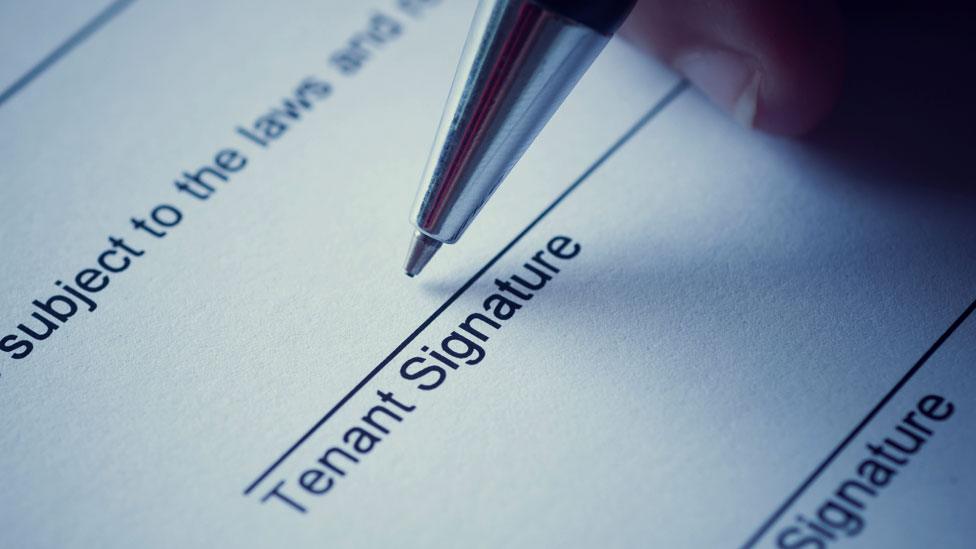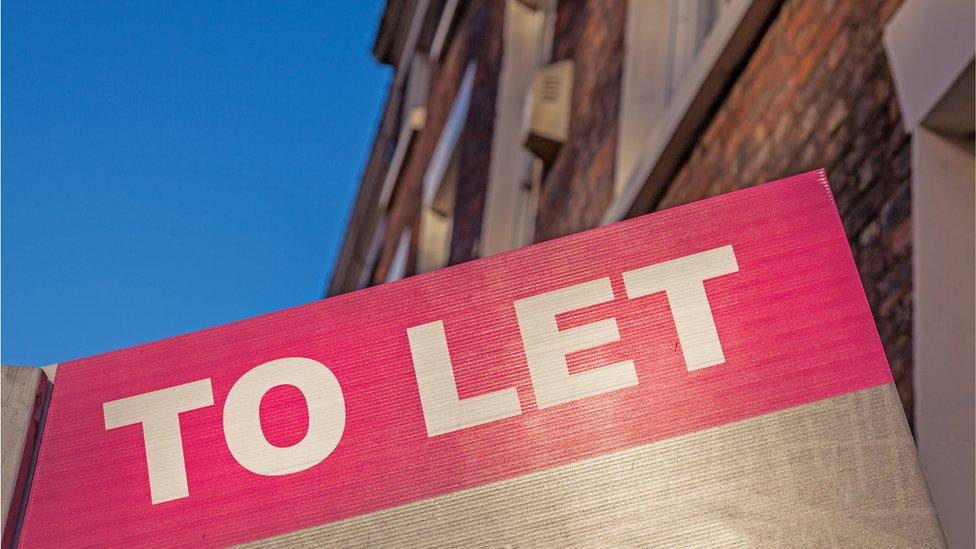Tenant rights: Can a landlord kick me out?
- Published

Millions of people pay monthly rent to a landlord for a room or a home, but many will be unclear about their rights as a tenant.
BBC News asked Citizens Advice to answer the 20 most commonly asked questions.
1. Can a landlord kick me out without a reason, and how much notice should I be given?
Your landlord can't evict you during the fixed term of a tenancy unless you breach a term in the tenancy agreement, such as not paying rent or damaging the property, unless there is a break clause in your agreement.
If you stay in the home beyond the fixed term and your landlord wants possession without a reason, they must give you at least two months' notice, often called a section 21 notice. There are a number of rules the landlord must follow for the notice to be valid. The landlord must apply to court for possession of the property if you don't leave when the notice expires.
You should get advice from an independent adviser, like Citizens Advice, if you receive a notice.
In Scotland, residential tenancies are open-ended, so tenants cannot be asked to leave simply because they have come to the end of the tenancy. If the landlord has grounds to evict the tenant, they must give 28 days' notice if the tenant has lived in the property for six months or less, or 84 days notice if the tenant has lived there for more than six months. For specific grounds, such as a criminal conviction, the notice is 28 days irrespective of how long they have been in the property.
In Northern Ireland, once the fixed term is up, landlords must give four weeks' written notice, known as a Notice to Quit.
2. Can a landlord increase rent at any time, and how much notice should I be given?
Your rent cannot normally be increased unless you agree or the tenancy agreement allows it. A rent review clause in a fixed-term tenancy will not apply after the fixed term ends, if your tenancy becomes "statutory periodic". This is when your fixed term ends and your tenancy automatically continues month-by-month or week-by-week - usually based on your rent payment period - until you or your landlord gives notice.

Landlords of periodic tenants can use special procedures to raise rents by giving you a formal notice, details of which are set down in law. This can be appealed against in England to the first-tier property tribunal, or to the rent assessment committee in Wales, which will determine a "market rent" for the property.
In Scotland, landlords can increase rent once a year but must give three months' written notice. Tenants can contact their local authority rent officer if they think the increase is too high
For Northern Ireland, once the fixed term is up, there are no limits to rent increases, either by how much or how often a landlord can raise the rent.
3. What can I do if my landlord fails to do basic repairs, deal with pests etc?
First, ensure you are not responsible for the repairs. Tenants are usually expected to do small maintenance jobs such as changing a light bulb or repairing damage they have caused.

If the landlord is not doing repairs they are responsible for, speak to them first to make sure they understand your concerns. If this does not help you can make a formal complaint by writing a letter to your landlord, explaining the problem, what you want them to do and including any evidence you have.
If this does not solve your problem you can go to your council, which can help with complaints about repairs that cause a risk to health and safety. Your council can look at your home and order the landlord to do the repairs if they think it is harmful to your health or safety.
Some landlords may try to evict a tenant who complains about repairs - so-called "retaliatory eviction". There is some legal protection for tenants in this position but talk to Citizens Advice if you're worried about this risk. You should not withhold rent because of repair issues because your landlord may then have reason to evict you.

Eviction by coercion may be an illegal eviction in Scotland, which is a criminal offence.
Scotland has had the Repairing Standard set of rules since September 2017. A tenant can refer the matter to the Housing and Property Chamber First Tier Tribunal for Scotland.
In Northern Ireland, there is no legal protection against retaliatory eviction.
4. When can a landlord withhold my deposit after I move out?
Most deposits should be protected in a tenancy deposit scheme and a landlord cannot take money from your deposit without either your agreement or arbitration by the scheme.

A landlord who has failed to protect a deposit may have to pay a penalty to the tenant and face restrictions on serving notice.
You might not get the full amount of your deposit back if, for example, you owe rent, you have damaged the property or you have lost or broken items on the inventory.
Landlords should not take money for reasonable wear and tear, such as a carpet that has gradually worn out over time, or to fix repairs that were their responsibility.
5. How long does he or she have to return my deposit?
If your deposit is in a tenancy deposit scheme, you should get your deposit back within 10 days of agreeing any deductions with your landlord. If you cannot reach agreement, you will need to check how to access arbitration with your scheme.
If your deposit has not been protected, seek help from Citizens Advice about recovering your deposit through the court. Your landlord may also have to pay you a penalty for failing to protect your deposit.
Scotland has similar deposit protection schemes.
In Northern Ireland, your landlord has 30 days to get your deposit back to you after agreeing any deductions.
6. If we are in dispute, can a landlord seize my belongings?
Your landlord has a legal obligation to look after any of your belongings left in a property after you have moved out or been evicted.
They must make reasonable efforts to trace you, and serve you with notice - usually 28 days, but three months if you owe them money - stating how you can collect the goods, and that they will be disposed of if they have not been collected by the expiry of the notice.

If the goods remain uncollected, the landlord may sell or dispose of them and make a deduction from any proceeds for expenses reasonably incurred in storage or disposal. The balance will belong to the tenant.
7. If a housemate moves out, whose responsibility is it to find a replacement?
If you have a joint tenancy with your housemate - each tenant is legally liable for the whole of the rent. This means, for example, that if they don't pay the landlord could pursue you, and any other joint tenants, for the money.
If your housemate is a joint tenant and wants to leave during the fixed term, they could find a replacement agreed by you and the landlord. It is a good idea to put the agreement in writing so everyone knows where they stand.
Without finding a replacement, your housemate would either have to continue paying rent in order not to breach the tenancy, or come to an agreement for them to pay you to make up the shortfall.

In each case, the landlord must agree to the change before you can go ahead as they need to agree to the surrender of the existing joint tenancy and the creation of a new tenancy.
If you are having problems you should get advice from an experienced adviser, like Citizens Advice.
For tenants in Northern Ireland, check your agreement to see if you are "jointly and severally liable". If you are, each tenant is liable for the rent of another who leaves; if not, the landlord would have to pursue the tenant for unpaid rent.
8. What is the procedure if I lose my keys?
If you do not have a spare set of keys then you should check if your landlord or their agent has a spare set of keys you can use to get a new set cut. Your tenancy agreement might also give details about how you can do this and any fees you will be charged for a replacement.
If there is no a spare set you can contact a locksmith to get the locks changed but you will have to pay for this and will also be responsible for any damage caused, for example, to the door or doorframe. Check your tenancy agreement to see if you have to tell your landlord if you change the locks.
9. What should the landlord do if I am harassed by a housemate?
You should try to speak to your housemate first to see if you can find a way forward, but only do this if you feel able to do so.

Your landlord may be able to help you by speaking to the housemate but there is no duty for them to do so. Your landlord may be able to take action to evict the housemate if they have breached the tenancy agreement in some way but this can take time. If you're a joint tenant and your housemate is evicted this would also end your tenancy so it is worth getting advice first.
If you are in fear of violence or if you are being racially or sexually harassed you should contact the police.
10. Can a landlord come into the property whenever they want?
The landlord has a right to reasonable access to carry out repairs for which they are responsible and to inspect the property, but usually they must give 24 hours' notice in writing.
In most cases, a landlord does not have the right to demand access without notice, or to enter the property without permission when the tenant is not there.
In Northern Ireland, the notice does not need to be in writing.
11. I have a disability. Can I demand the landlord make a property suitably accessible?
If you have a disability and are having accessibility trouble in your home, you can ask your landlord to either make adaptations or let you make the changes. If your landlord refuses, seek advice from an experienced adviser, like Citizens Advice.
One city, seven agents... and nowhere I can live
Disabled facility grants from local councils - or the Housing Executive in Northern Ireland - are available to landlords and tenants to cover the costs of adaptations in some circumstances.
12. Can a landlord refuse someone receiving housing benefits, or Universal Credit?
Not all landlords and letting agents allow housing benefit or housing costs payments through Universal Credit, but you only need to say you receive them if they ask.
You might be able to get a landlord or letting agent to accept you by giving extra references or you could also get a guarantor (someone who agrees to pay the rent if you don't).
Ask your council if they have a list of landlords and letting agents who will rent to people who are getting Housing Benefit or Universal Credit, although this does not apply in Northern Ireland.
13. Can I be charged for wear and tear, and how does the landlord decide on the amount?
Check your tenancy agreement to see if you have agreed to leave the property in a certain condition. In general, you shouldn't be charged for wear and tear, but the landlord might ask you to pay for damage beyond that.

If you've paid a deposit, the landlord might ask for that payment to be deducted from the deposit. If you can't agree, you can ask the tenancy deposit scheme that holds your deposit to make a decision.
14. Can a landlord check my credit rating to see if I am at risk of failing to pay my rent?
Yes they can, but they must ask for your permission first.
If you plan to rent through a letting agent and have bad credit history, tell them before they take any fees as you may not get these back.
If the landlord refuses you because he thinks there is a risk of you not paying the rent, you could offer rent in advance if you can afford it, or a guarantor - if one is available - to secure the property.
15. How much can a lettings agent charge for administration fees?
Most lettings agents will charge you to check your references and credit - the amount you can be asked to pay can vary a lot between agents. You might also be asked to pay fees if you renew your tenancy.

Ask about your letting agent's fees before taking the property and before you pay any money. Their fees must be displayed on their website and in their offices. They have to give you details of their fees before you agree to rent.
It is against the law for your letting agent to charge you for registering with them and giving information or lists of properties available for rent, although this may not apply in Northern Ireland.
In Scotland, there is a mandatory register of lettings agents. Apart from rent and the security deposit, letting fees have been banned in Scotland since 2012.
16. Can a landlord prevent me from having friends or family to stay overnight?
You are entitled to "quiet enjoyment" of your home, which includes having the occasional overnight visitor. In some cases tenants will be held responsible for the behaviour of their visitors that could lead to renters breaching their tenancy agreement.
Any term in a tenancy agreement that says you can't have overnight guests without permission from the landlord or that you have to pay a fee is likely to be "unfair" and unenforceable.

You should bear in mind the risk of eviction if you are outside a fixed term and you antagonise your landlord. Be clear your guest is a visitor and you're not sub-letting. Most tenancy agreements say that you are not allowed to sub-let all or part of your property without your landlord's agreement. If your guest pays money to stay it's likely to be seen as sub-let.
17. What can I do if I think I'm being discriminated against for ethnicity, religion or nationality?
If you think you are being discriminated against because of your disability, gender reassignment, pregnancy and maternity, race, religion or belief, sex or sexual orientation, you may be able to take legal action.
You should get advice from an experienced adviser, like Citizens Advice.
18. If I'm evicted at short notice, where can I go?
You should seek help immediately from an independent adviser, like Citizens Advice. An adviser will be able to check whether your landlord has followed the correct procedure to evict you and whether you have rights to be allowed back into your property. They should also be able to help you with finding alternative accommodation.

Also, if you are homeless, your local council may have to help find you somewhere to live. Depending on your circumstances, they might also provide you with emergency accommodation. Again, an independent adviser will be able to help you with this application.
In Northern Ireland, the Housing Executive may have to help you find somewhere to live.
19. What should I do if I am struggling to pay the rent on time?
If you need help to pay your rent you may be able to apply for housing benefit or for help with your housing costs from Universal Credit.
You may also be entitled to other benefits if you are unemployed or on a low income. If you are struggling with debt, seek help from an independent adviser, like Citizens Advice.
20. Are there any specific issues in Wales and Scotland?
Landlords must be registered in Wales. If you feel your landlord has done something wrong, check your landlord is registered as there are financial penalties if they're not. If the landlord holds a licence, it may be revoked for not following the code of conduct.
In Scotland, landlords must register with the local council. The local authority must be satisfied that the owner of the property and the agent are fit and proper to let residential property, before registering them. Tenants can search the register and it is an offence for a landlord not to register.

This advice applies to assured shorthold tenants, and most private tenancies in Northern Ireland. In Scotland, a new tenancy law was enacted in December 2017, affecting new tenancies from 1 December 2017, and the differences are explained where possible.
- Published11 May 2018

- Published9 July 2020

- Published11 May 2018

- Published11 May 2018

- Published11 May 2018
